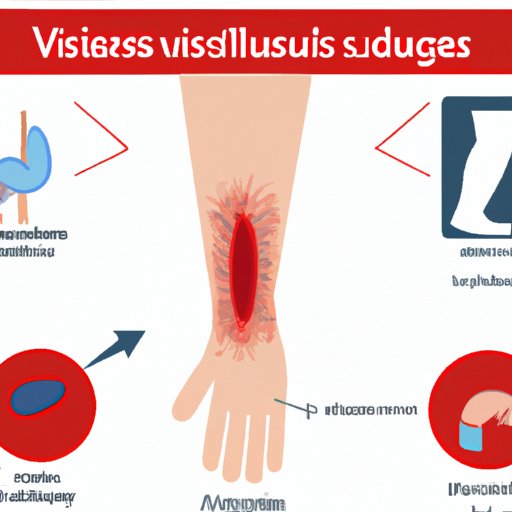
Introduction
Have you ever heard of Vasculitis disease before? Well, Vasculitis disease refers to a group of diseases that cause inflammation of the blood vessels, leading to damage on the wall of blood vessels. It can affect any part of the body and may result in life-threatening consequences. If you have been diagnosed with this disease or you’re simply curious, this article will provide you with comprehensive information about Vasculitis disease.
Everything You Need to Know About Vasculitis Disease: Causes, Symptoms, and Treatment Options
The exact cause of Vasculitis disease is unknown; however, researchers suggest that it occurs when the immune system mistakenly attacks its blood vessels. There are different types of Vasculitis disease, and each type has unique symptoms and affects different parts of the body. Some of the possible risk factors that may cause Vasculitis disease include; infection, chronic or long-term use of some medicines, certain cancers, genetics, and autoimmune diseases.
Some of the common symptoms of Vasculitis disease include; fever, coughing, headache, vision loss, nerve problems, skin rashes, joint pain, and abdominal pain. In some cases, patients may not experience any visible symptoms of Vasculitis disease until critical damage is done to their body system. Hence, early detection is crucial.
Treatment options for Vasculitis disease aim to prevent severe damages and relieve symptoms. The standard treatment for Vasculitis disease may include; immunosuppressants, corticosteroids, and biological agents. Blood-thinning medications, antibiotics, and other medications may also be used depending on the affected area and the severity of Vasculitis disease.
The Silent Destroyer: Understanding Vasculitis Disease and its Hidden Risks
Vasculitis disease can be a silent destroyer, which means that damage can occur to the body system without any visible symptoms. It could lead to severe complications and long-term effects if not detected early. For instance, when Vasculitis disease attacks the blood vessels of the heart, it could result in heart disorders such as aneurysms, heart attacks, and even death. It’s essential to take preventive measures, especially if you have risk factors such as family history or autoimmune disorders.
Contrary to common thoughts, people who do not have any risk factors could also be at risk of developing Vasculitis disease. Hence, seeking medical attention to rule out or confirm the disease is crucial for early detection as treatment options are more effective.
Living with Vasculitis: Real Stories of Coping and Overcoming the Painful Disease
Living with Vasculitis disease can be challenging, both physically and emotionally. Patients living with the disease often struggle with coping mechanisms and find it challenging to adjust to their new lifestyle. However, hearing about the experiences of individuals who have successfully coped and overcome the disease can be inspiring and encouraging.
Support groups for people with Vasculitis disease can provide a platform for such individuals to share their experiences with people who can relate, and who can understand what they’re going through. These groups offer counseling and therapies that could help improve patients’ mental and psychological wellbeing. Finding support and sharing your experience is a crucial step towards coping and overcoming the challenges of Vasculitis disease.
A Comprehensive Guide to Vasculitis Disease: What You Need to Know to Protect Yourself
Protecting yourself from Vasculitis disease requires adopting a healthy lifestyle and seeking medical attention when necessary. Taking preventive measures such as quitting smoking, managing chronic infections, and controlling the use of some medications can help reduce the risk of developing Vasculitis disease.
Early detection and treatment of Vasculitis disease are crucial to improve the chances of recovery. It’s essential to monitor symptoms and report any unusual occurrences or abnormalities to your healthcare professional. Your healthcare provider may recommend medications and lifestyle changes that could help manage symptoms and prevent the disease from progressing into more severe complications.
The Science Behind Vasculitis: How Researchers are Working Towards Finding a Cure
Current research efforts towards finding a cure for Vasculitis disease are aimed at identifying the specific causes of the disease and developing new treatment methods. While there is no cure or specific treatment for Vasculitis disease, recent findings have contributed immensely to the development of potential treatments that could help suppress the immune system’s response.
Vasculitis disease is a rare disease, which makes it challenging to conduct clinical research on its causes and treatment. However, researchers suggest that increased awareness and advocacy could help facilitate funding, support research, and ultimately find a cure. Volunteerings for research studies or joining support groups for individuals with Vasculitis disease could also contribute to ongoing research efforts.
Conclusion
Vasculitis disease is a complex disease that requires individualized treatment options. Seek medical attention if you experience any abnormal symptoms, especially if you have risk factors for the disease. Take preventive measures and adopt a healthy lifestyle to reduce the risk of developing Vasculitis disease. Remember that early detection and treatment of Vasculitis disease is crucial to prevent irreversible complications.
Living with Vasculitis disease can be challenging, but hearing about the experiences of others could be inspiring. Join support groups and find support to help you cope and overcome the challenges of Vasculitis disease.
Lastly, spread the word and contribute to ongoing research efforts towards finding better treatment methods and ultimately a cure for Vasculitis disease.




